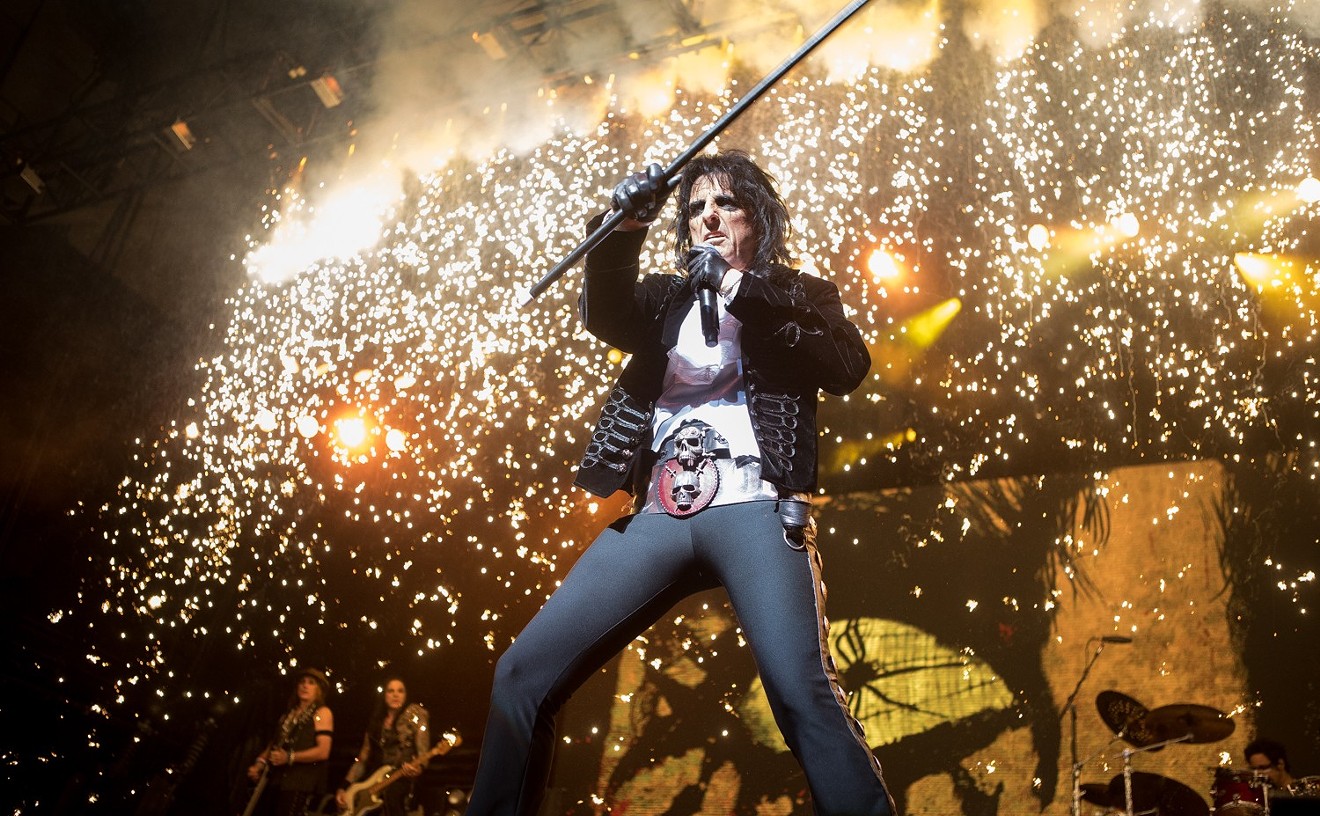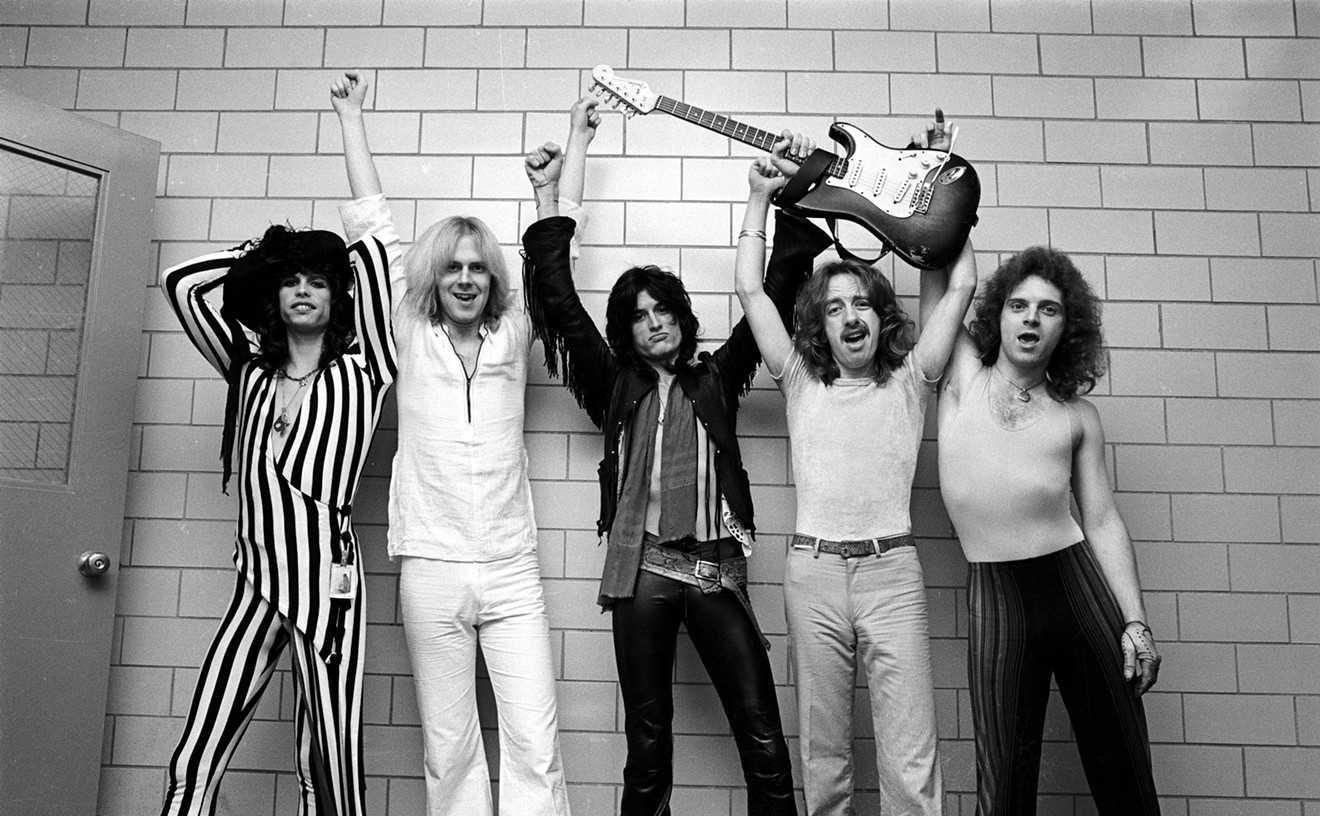"Hey, if it wasn't for Dad's connections, I wouldn't have made it anywhere," McMurtry says during a telephone conversation from his Austin, Texas, home. "It's really that simple."
Yet the 30-year-old McMurtry, whose second Columbia Records release, Candyland, is a fine, stark testament to small-town angst, didn't just one day dun Dad to make a few telephone calls on his behalf. In fact, it wasn't until his early-Eighties tenure in Tucson that young McMurtry realized he might very well like to make music for a living. And, despite his quiet admissions to the contrary, the path he used to get here from there he blazed pretty much on his own.
Early on, however, James McMurtry's life was tinged with privilege. His father and mother--University of Richmond Shakespeare professor Josephine McMurtry--divorced while James was still in diapers. His father took him to Houston, where, until 1969, Larry McMurtry taught creative writing at Rice University. Father and son lived in a small frame house well out of the city, a home "in the middle of nowhere" that young McMurtry eventually dubbed "the Wasteland." When the elder McMurtry would embark on a tour, James would stay with his mother or, more often because of convenience, at his grandfather McMurtry's ranch in Archer County, Texas.
"It wasn't that bad," James McMurtry recalls. "I saw my mom a lot. When I was about 7, she taught me three chords on the guitar. It started me off, and I learned the rest on my own." When James was 12, he portrayed Cybill Shepherd's bratty, bucktoothed brother in director Peter Bogdanovich's Daisy Miller. "Obviously," McMurtry says, dryly, "Dad had something to do with that."
Most of McMurtry's high school days were spent at a high-class, high-priced Virginia boarding school where he acted a little in class productions, went to school in the mornings and fished in the afternoons.
After a postschool trip to Spain as a teacher's aide, McMurtry returned stateside and took up residence in Tucson, where he took English and Spanish classes at the University of Arizona. Yet academia wasn't bound to be his world. "To my mother's distress, I think," McMurtry says. After four years of wandering around the Wildcat campus, McMurtry found himself with just enough credits to be classified as a sophomore.
"I was more interested in playing the guitar than going to class," McMurtry confesses. "I played back-up with the Arizona Old-Time Fiddle Association for a while, but that got old. They're a conservative bunch, and I was getting into jazz and blues--Lightnin' Hopkins and stuff. They couldn't get into it."
Still, the Old Pueblo and parts nearby have a number of personal landmarks for McMurtry, and he remembers his time there with nothing but fondness.
"My first paying gig was at the Riverside Bar in Benson. I'll never forget that," McMurtry states firmly. "But mostly I just hung out, though I played a lot at the Saw Mill Cafe, thinking I was going to be a great flat picker like Doc Watson and Norman Blake." He laughs, gently. "What I found out, though, was that what I wrote seemed to stand out more than what I played."
McMurtry abandoned Tucson--and college--in the summer of 1984 to travel. He soon found himself at a tiny roadhouse in Talkeetna, Alaska--just a snowball's throw from Mount McKinley. He quickly tired of playing background music behind family dinners, and he repaired to Texas, where he spent three months painting the Wasteland house. After that he drifted to San Antonio, painted more houses, tended bar, played some and began to seriously write songs.
In 1987 McMurtry decided to enter the renowned Kerrville New Folk Festival and competition. He was stunned when he was named one of six winners.
"That was a major thrill, a real direction provider," McMurtry recalls. "It especially meant a lot that [contest judge] Ian Tyson liked my stuff." Ex-Free Mexican Air Force pilot Peter Rowan also was impressed with the young singer-songwriter's work, and McMurtry spent a spell playing with Rowan's pickup band.
It was also in 1987 that James McMurtry caught the break he is swift to attribute to his father. Hoosier rocker John Mellencamp had commissioned Larry McMurtry to write a screenplay for which the erstwhile Cougar man would write the soundtrack. At some point, a tape of James' songs--vivid vignettes of small-town life, landscapes and love lost, won and borrowed--ended up in Mellencamp's hands.
Impressed, Mellencamp got McMurtry a deal with Columbia Records and scheduled recording time in Mellencamp's own Bloomington, Indiana-based Belmont Studios. He also produced McMurtry's debut.
"I was scared to death," McMurtry admits, allowing himself the sparest of chuckles. "I couldn't sleep. I only had about seven songs done, and there was all this money swinging around."
When Too Long in the Wasteland was released in July 1989, it met with instant critical acclaim, eventually earning a spot on Rolling Stone magazine's year-end Best Debut Album list. Gigs on Late Night With David Letterman, Austin City Limits and Nashville Network's American Music Shop soon followed. McMurtry hit the nightclub and festival circuit, as well, touring with such luminaries as the BoDeans, Adrian Belew, David Bromberg, Arlo Guthrie and Indigo Girls.
McMurtry spent much of 1990 working on the soundtrack to Falling From Grace, the movie Mellencamp paid Larry McMurtry to write for him several years earlier. Although the movie didn't fare well, the soundtrack--which featured "Buzzin' Cousins" James McMurtry, John Mellencamp, John Prine, Joe Ely and Dwight Yoakam--found considerable success.
The balance of the year McMurtry spent at Belmont Studios working on Candyland, with Mellencamp band member Michael Wanchic producing McMurtry's sophomore effort. In October 1990, McMurtry took a break from the project to be with his wife, Elena, as they greeted son Curtis' entry into life.
While management-company woes delayed Candyland's release until early this year, McMurtry used the time to tour, to play Farm Aid V last March and to tend to his growing family.
As with his first album, Candyland is filled with detail-packed musical still lifes. "Where's Johnny?" is about a star student-athlete, a ladies' man who ". . .went off to college/Got his head stuck in a different state of mind" and returned home, where his mother ". . .polishes his trophies and wonders where her little boy. . .has gone." Dreams turn into stark nightmares in the eerily opaque "Vague Directions," while the title track considers the isolation and frightening sameness of suburbia, where "Heels grow tall and the skirts hang low/There could be something there but they just won't let it show."
McMurtry's cool, driving melodies at once underscore and belie the subtle terror of his images of tract-home Americana, and his baritone adds clarity to the urgency of his words.
James McMurtry was recently in the Valley with fellow singer-songwriters Marshall Crenshaw, Don Dixon, Jules Shear and David Halley in a touring version of New York City's Bottom Line Cafe's "In Their Own Words" series. The singers interspersed their songs with anecdotes and observations in an informal, synergetic, sit-down fashion.
"All the 'In Their Own Words' guys flat amazed me," says McMurtry, "although I didn't much like the format. And the Phoenix date didn't go well at all." In addition to the sudden withdrawal of radio support (a disc jockey was to play emcee; an irritated tour manager ended up doing the job), the venue here, the Library Cafe, was loud and raucous, and hardly conducive to the lyric-rich acoustical work of the artists. In light of that experience, it should be interesting to see how McMurtry fares--solo, armed only with a six-string guitar--when he plays at, of all places, the bruise-metal Mason Jar on July 22.
Yet the ever-laid-back McMurtry isn't concerned. Candyland is doing just fine, thank you, and while he's become a dedicated family man, he still enjoys the challenges and surprises found on the road.
And as for his father's part in his growing success, or John Mellencamp's role, for that matter, McMurtry insists that it couldn't have happened without them. But, he concedes, while dad and Cougar may have shown him the right door and, perhaps, even opened it for him, "I guess I did have to go through it and earn a reason to stay." There's a long, studied pause and a gentle clearing of the throat.
"Well," mumbles James McMurtry slowly, quietly, fishermanlike. "How about that.










